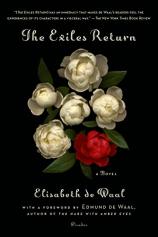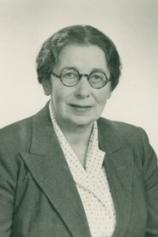The Exiles Return
Review
The Exiles Return
One of the best memoirs I’ve read in recent years is THE HARE WITH AMBER EYES, Edmund de Waal’s masterly account of his forebears, the Ephrussis, a prosperous Jewish banking family that settled in Vienna in the mid-19th century. This novel, THE EXILES RETURN, is by his grandmother Elisabeth; he found the typescript among her papers in 2005. She had tried and failed to get it published and died in 1991 believing, as Edmund reports in his Foreword, that it was “a book that no one will read.”
I trust that Elisabeth is smiling in her grave. It was published in the UK in 2013, the 75th anniversary of the Anschluss (Hitler’s 1938 takeover of Austria). I want to give a shout-out to its British publishers, a marvelous small press called Persephone that, in their words, “reprints neglected fiction and non-fiction by mid-twentieth-century (mostly women) writers.” In this case they celebrated not a reprise but a debut.
Edmund de Waal calls the novel “profoundly autobiographical. Born into a privileged family, Elisabeth achieved intellectual stature in her own right, studying philosophy, law and economics at the university and writing poetry (she corresponded with Rilke, no less). After the Anschluss, though she had already left Vienna, she returned to save her parents; she went back again after the war to try to get restitution for their shattered lives and looted property. She knew intimately what it was like to confront a ravaged homeland.
The first half of THE EXILES RETURN is taken up with the stories of five expatriates who return to Vienna in 1954. They could not be more different. Professor Kuno Adler is a Jewish scientist who has been living in New York with his unpleasant and successful wife. Although upon his return he is reinstated in the lab where he formerly worked, he occupies a lowly position and is baited by the director, a chillingly unabashed former Nazi. Adler is de Waal’s finest creation, of all her characters the most subtle in his thinking and the most naked in his wistful longing to rediscover Vienna by going to its roots. Wandering about the city and the surrounding countryside, he discovers a quiet joy in solitude, very unlike the loneliness he’d felt in exile (“like an incurable disease”).
"[T]his is a haunting novel that explores age-old questions of memory, identity and loss, and how they are embedded in a particular time and place. Its elegiac atmosphere, if not its plot, has staying power. "
Theophil Kanakis is a wealthy Greek businessman living in America whose family, not unlike Elisabeth de Waal’s, was a force to be reckoned with in prewar Vienna. He sees the city principally as a choice spot for a nostalgic retreat that he will fill with antique objets d’art and glamorous young people. A blend of crass capitalist and decadent connoisseur, Kanakis is thoroughly unlikable but not without weakness. He has a passion for a disreputable, impoverished prince who goes by the unlikely nickname of Bimbo (the vagaries of English slang can create anomalies when publication is delayed for nearly 60 years!). Bimbo and his sister --- the virtuous Nina, who lives modestly, calling herself not Princess but Fräulein --- were orphaned after the Nazis murdered their antifascist parents, then hidden during the war. They, too, are trying to reclaim Vienna.
The last of de Waal’s protagonists is the daughter of exiles, an Austrian princess and Danish chemist who have resettled in suburban America. Eighteen-year-old Marie-Theres, known as Resi, is a bored, restless young woman, and her parents hope a visit to Austria will help. First she stays in the countryside with her Aunt Franzi, a countess, and then in Vienna proper with another of her mother’s sisters. Resi is ravishingly beautiful, but indifferent to the young men who court her --- until she meets Bimbo at one of Kanakis’s parties. In this louche, amoral world, her innocence dooms her.
De Waal’s candor about less conventional pathways of love (homosexuality, extramarital sex, and teenage pregnancy and abortion all figure in the book) was likely a radical choice for the late 1950s. Could that have been a factor in her failure to find a publisher? I remember, in the same period, the scandal of an American play, later a movie, called Blue Denim, that dealt frankly with issues of adolescent pregnancy and (then illegal) abortion.
But there may be other reasons that THE EXILES RETURN didn’t get published. I hope it is no offense to the dead to say that I think it is more successful as historical testimony than as fiction.
It is not that de Waal lacks talent as a writer. Her descriptive powers are impressive; she evokes postwar Vienna in all its melancholy beauty and lingering sense of menace and gives Resi, Adler and Nina a finely tuned emotional life (not so for the less savory characters, who remain more one-dimensional and serve mainly as bad fairies who drive the tragic action). Here is Adler, apprehensive as his train first crosses into Austria: “It felt like a physical sickness, a mental darkness….[H]e was an animal, tense, wary, charged with feeling, stripped of reason.” Here he is again a few months later, on a May night in Vienna when he sits by his window “breathing the scent of lime and lilac and feeling myself languish in an overpowering and aimless desire, the desire of the young man for love.”
But the book isn’t structured effectively; the entire first half is devoted to each of the exiles in turn, and I grew impatient at the lack of focus. Although connections among them are finally established, these plot devices arrive so late in the day that they often seem forced. And de Waal’s dialogue tends to be mannered; the scene between Adler and the head of the lab, for example, approaches melodrama. (Would this monster really confess his inhumanity to a Jewish colleague of whom he is envious and distrustful?)
And yet, this is a haunting novel that explores age-old questions of memory, identity and loss, and how they are embedded in a particular time and place. Its elegiac atmosphere, if not its plot, has staying power.
More than 400,000 U.S. citizens died in World War II. But our territory was not breached: our families slaughtered or exiled, our belongings seized, our whole way of life destroyed in an instant. Most Americans can never quite understand what it means to have that happen. THE EXILES RETURN helps us to grasp such a cataclysm by capturing the bittersweet destiny of those who assert, to paraphrase Thomas Wolfe, that they can go home again.
Reviewed by Kathy Weissman on January 31, 2014
The Exiles Return
- Publication Date: January 13, 2015
- Genres: Fiction, Historical Fiction
- Paperback: 336 pages
- Publisher: Picador
- ISBN-10: 1250063744
- ISBN-13: 9781250063748




